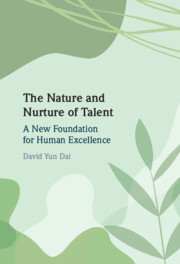Book contents
- The Nature and Nurture of Talent
- The Nature and Nurture of Talent
- Copyright page
- Dedication
- Contents
- Illustrations
- Foreword
- Acknowledgments
- Introduction Rationale, Goals, and Overview of the Book
- Chapter 1 The Evolving Complexity Theory of Talent Development
- Chapter 2 The Question of What Develops
- Chapter 3 The Question of How Talent Develops
- Chapter 4 The Question of When Critical Events Should Take Place
- Chapter 5 The Question of Where
- Chapter 6 How ECT Explains Various Talent Achievements
- Chapter 7 ECT in a Broader Landscape of Theoretic Models
- Chapter 8 Implications of ECT for Talent Identification and Assessment of Developmental Progressions
- Chapter 9 Implications of ECT for Promoting Human Excellence
- Chapter 10 Implications of ECT for Research Methodology
- Epilogue Is AI a Threat to Human Excellence?
- Postscript
- Glossary
- References
- Index
Chapter 10 - Implications of ECT for Research Methodology
Toward a New Epistemology of Human Excellence
Published online by Cambridge University Press: 20 June 2024
- The Nature and Nurture of Talent
- The Nature and Nurture of Talent
- Copyright page
- Dedication
- Contents
- Illustrations
- Foreword
- Acknowledgments
- Introduction Rationale, Goals, and Overview of the Book
- Chapter 1 The Evolving Complexity Theory of Talent Development
- Chapter 2 The Question of What Develops
- Chapter 3 The Question of How Talent Develops
- Chapter 4 The Question of When Critical Events Should Take Place
- Chapter 5 The Question of Where
- Chapter 6 How ECT Explains Various Talent Achievements
- Chapter 7 ECT in a Broader Landscape of Theoretic Models
- Chapter 8 Implications of ECT for Talent Identification and Assessment of Developmental Progressions
- Chapter 9 Implications of ECT for Promoting Human Excellence
- Chapter 10 Implications of ECT for Research Methodology
- Epilogue Is AI a Threat to Human Excellence?
- Postscript
- Glossary
- References
- Index
Summary
Chapter 10 explores epistemological and methodological implications of ECT. The overarching issue is whether one adopts a reductive logic or an emergent logic, and whether one is mainly concerned with linear causation versus emergence. The former helps map out developmental diversity from a population perspective, and the latter inductively derives the emergence of new structures, properties, and patterns through real-time person–task interaction. The further issue is making decisions on using person-centered versus variable-centered approaches. At a more epistemological level, ECT does not endorse the deductive logic of falsification, which has a deterministic connotation. Given the indeterminacy involved in talent development, ECT argues that theoretical predictions regarding short-term and long-term outcomes can be based on soft constraint satisfaction as a new epistemology guiding predictions, which dictates that talent trajectories, pathways, and achievement patterns are indeterminate but principled. The chapter thereby proposes five terms (emergence, adaptation, divergence, excellence, and coherence) as organizing research that taps into probabilistic epigenesis, proximal processes, and developmental self-organization toward higher-order coherence. Each term constrains the structure of inquiry and methodology, including what timescale of action is appropriate, and whether quantitative or qualitative, deductive or inductive methods should be used.
Keywords
- Type
- Chapter
- Information
- The Nature and Nurture of TalentA New Foundation for Human Excellence, pp. 215 - 238Publisher: Cambridge University PressPrint publication year: 2024

